NHL History: Who is the most dominant team of the last decade?

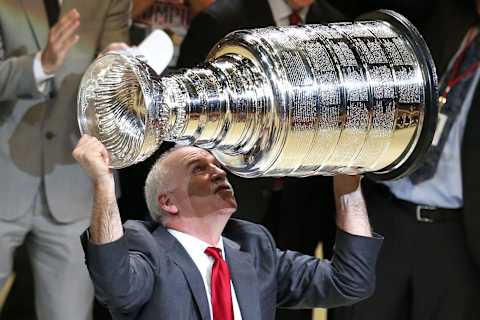
The last decade has seen some of the best hockey in NHL history, featuring the rise of dominant playoff and regular season teams. But which team should be considered the best of the past decade?
For NHL history buffs, one of the ways to pass the time is to debate how some of the great teams of the past compare to each other. Who was better, the 1977 Montreal Canadiens or 2002 Detroit Red Wings? The 1988 Edmonton Oilers or 1992 Pittsburgh Penguins?
As this current decade nears its end, those same discussions are bound to come up regarding some of the great teams fans have seen recently. However, without knowing how history looks back on these teams, it may be difficult to make these comparisons.
To help with this, let’s utilize the What If simulator. Based on the relative strengths of whichever teams are pitted against each other, the engine simulates a full game between the two.
While this is obviously not foolproof (the 1975 Washington Capitals have defeated the 2013 Chicago Blackhawks on more than one occasion), it is a fun way to compare the relative dominance of two teams.
As this current decade nears its end, those same discussions are bound to come up regarding some of the great teams fans have seen recently.
This post will put the eight best teams of the past eight seasons in a best-of-seven elimination tournament against each other using the What If simulator. No changes are made to lineups, and each game is simulated in playoffs mode.
There were some restrictions on what teams could be chosen, however. For one, the website does not have teams from this past season uploaded yet, so the range of time is from the 2009-10 season to the 2016-17 season.
Additionally, the decision was made to have just one team represent each franchise so that there would be more variation. Because of that, there is only one Chicago Blackhawks team, even though they won three Stanley Cups over that time span.
The teams were chosen and ranked as follows (with justification included):
- 2012-13 Chicago Blackhawks (77 pts (lockout), Stanley Cup, Presidents’ Trophy)
- 2016-17 Pittsburgh Penguins (111 pts, Stanley Cup)
- 2010-11 Boston Bruins (103 pts, Stanley Cup)
- 2013-14 Los Angeles Kings (100 pts, Stanley Cup)
- 2009-10 Washington Capitals (121 pts, Presidents’ Trophy)
- 2014-15 New York Rangers (113 pts, Presidents’ Trophy)
- 2011-12 Vancouver Canucks (111 pts, Presidents’ Trophy)
- 2015-16 Dallas Stars (109 pts, Western Conference Finalists)
As is obvious by the seeding, the Stanley Cup-winning teams were given preferential seeding, followed by Presidents’ Trophy-winners, and finally the 2015-16 Stars, who were only chosen because that year’s Stanley Cup and Presidents’ Trophy-winners already had representatives.
The tournament will follow a typical 1 versus 8 format, with reseeding after each round. Without further ado, let’s find out who is the best team of the past decade.
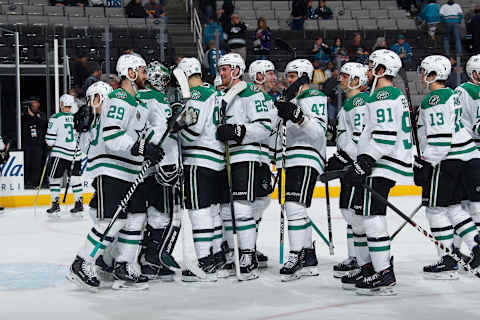
(1) 2012-13 Blackhawks Versus (8) 2015-16 Stars
Game 1
2. 119. 5. 94. Final
Game 1 goes to the home team Chicago Blackhawks, who win by a score of 5-2. The Blackhawks got off to a fast start, scoring the game’s opening goal just 3:23 in, courtesy of Marian Hossa. By the end of the period, Andrew Shaw, Patrick Sharp and Nick Leddy added goals to put the Hawks up 4-0 after 20 minutes.
Dallas made things interesting with goals from Jamie Benn in the second period and Tyler Seguin in the third. Unfortunately, that was as close as they would get, as Hossa scored his second goal of the game at 16:58 to ice it.
Game 2
5. 94. Final. 2. 119
Two games, two 5-2 victories for the home team Blackhawks. Jamie Benn opened the scoring at 10:11 of the first period. Unfortunately, the Blackhawks came right back, scoring twice in 16 seconds, to take a 2-1 lead into the intermission.
The second period was scoreless until Jonathan Toews struck at 16:18 to put the Hawks up 3-1. Benn responded with his second goal of the night right before the intermission to keep the Stars in it.
It was not enough, however, for the overmatched Stars. Brent Seabrook scored his second of the game at 6:33 to restore Chicago’s two-goal lead, and Duncan Keith added an insurance marker at 18:40, as the Hawks won their second straight 5-2 home game.
Game 3
2. 119. Final. 1. 94
The Stars are finally on the board in this series, as they take Game 3 2-1 at home! Chicago’s Marcus Kruger struck just 2:33 into the first period to put the Blackhawks up 1-0 early.
Valeri Nichushkin scored to put the Stars on the board, and as the rest of regulation went by scoreless, the two teams went to overtime for the first time in the series.
Chicago dominated the OT session, outshooting Dallas nine to four, but Mattias Janmark scored unassisted to get the win for Dallas and cut the series deficit in half.
Game 4
Final. 1. 94. 6. 119
The Stars explode for a 6-1 thrashing of the Blackhawks to even the series at 2-2! Dallas turned the table a bit in this one, as this time it was the Stars scoring just 17 seconds in, courtesy of Jason Spezza, to take the early 1-0 lead. Ales Hemsky extended the lead just five minutes later, and Dallas took a 2-0 lead into the intermission.
Marian Hossa got back on the scoresheet in the second, bringing the Hawks back within one, but Spezza responded with his second of the game and the home team took a two-goal lead into the intermission.
It turns out the Spezza show was just getting started, as he scored again just 20 seconds into the third period to finish off the hat trick, then added a fourth goal just two minutes later, as his fourth goal of the game put Dallas up 5-1. Alex Goligoski rubbed some salt into Chicago’s wounds with a goal on replacement goaltender Ray Emery, and Dallas ran away with Game 4 6-1 to tie the series.
Game 5
3. 119. 2. 94. Final
One of the most exciting (hypothetical) playoff games in NHL history sees the Stars take a 3-2 series lead.
The game started innocently enough, with neither team scoring for most of the first period. Chicago took a 1-0 lead into the intermission thanks to a goal from Brandon Saad.
The second period went by without any scoring. However, the Stars suddenly exploded in the third period, scoring two goals in four seconds to take a 2-1 lead with under 14 minutes left in regulation.
Chicago continued to press for the rest of the period, including pulling goaltender Corey Crawford. Their risk paid off, as Patrick Kane scored his first goal of the postseason with just 20 seconds left in regulation!
However, just three seconds later, former Hawk Patrick Sharp scored for the 2015-16 Stars to restore Dallas’s lead! The Stars held on the rest of the way and took an absolute thriller for their third straight victory and 3-2 series lead.
Game 6
119. Final. 3. 94. 4
(8) 2015-16 Dallas Stars over (1) 2012-13 Chicago Blackhawks, 4-2
And just like that, the top-ranked team in the tournament has been eliminated in six games. The game began without much scoring but with lots of physicality, as the Stars were sent shorthanded twice, while Chicago took one penalty, in the first period. Neither team was able to capitalize, and there was no score after 1.
The scoring started in the second, as Jonathan Toews finally scored for just the second time in the series, his power-play goal putting Chicago up 1-0.
Ales Hemsky would respond for Dallas, but was answered by Marian Hossa, who restored Chicago’s one-goal lead with just under seven minutes left in the second period.
However, while it looked as though Chicago would take a 2-1 lead into the third, Travis Moen scored his first goal of the series with just 49 seconds left, and the game was tied entering the third period.
The Stars would get their first lead of the game just two minutes into the final frame, with Antoine Roussel’s first goal of the series. Andrew Shaw responded five minutes later to tie the game at 3.
The tie was short-lived, however, as Jamie Benn scored his fourth goal of the series to put Dallas back on top, 4-3, with 12:09 left in regulation
In the end, this was a truly shocking upset. The 2012-13 Chicago Blackhawks are one of the few teams in NHL history to win the Presidents’ Trophy and Stanley Cup in the same year, so they were expected to advance deep into this tournament.

(2) 2016-17 Penguins Versus (7) 2011-12 Canucks
Game 1
1. 92. Final. 2. 104
The 2011-12 Canucks have taken home ice advantage away from the 2016-17 Penguins with a 2-1 victory in Game 1. After a scoreless first period, things changed quickly for the Canucks in the second period. Chris Higgins opened up scoring in the series at 1:19 of the frame to put Vancouver up 1-0.
At 15:42 of the third period, Chris Kunitz levelled the score at 1-1 to add some intrigue to the final few minutes. Unfortunately for Pittsburgh, just as it appeared as if they might be sending the game into overtime, Henrik Sedin struck with just 2:08 left in regulation to give the Canucks the unassailable 2-1 lead, as Vancouver took Game 1.
Game 2
3. 104. 2. 92. Final
The Canucks take a 2-0 series lead back home with the chance to advance in the tournament. Unlike in Game 1, both teams got out to a fast start in Game 2. This time it was the Penguins striking first, with Evgeni Malkin scoring just 1:04 into the game to put Pittsburgh up 1-0.
However, it would not be long before the Canucks responded. Sami Salo scored his first goal of the series at 4:42 of the frame to tie the score at 1. Higgins’ goal at the 17:30 mark gave Vancouver a 2-1 lead after the first 20 minutes.
Trevor Daley tied things up in the second period, but Maxim Lapierre scored the only goal of the frame for the Canucks with just 52 seconds left in regulation. Vancouver was able to shut the door from there, and won their second straight late-game thriller to take a 2-0 series lead.
Game 3
104. Final. 3. 92. 2
Just when all hope seemed lost for Pittsburgh, they pulled off a great comeback to get on the board in this series. Sidney Crosby gave the Penguins an early 1-0 lead. However, Lapierre scored his second goal of the series in the second period after Pittsburgh gave the Canucks too many power-play chances.
He would later add his second goal of the game in the third period. However, just when things seemed to be at their bleakest for Pittsburgh, they struck back hard. Patric Hornqvist and Jake Guentzel scored just over a minute apart in the waning moments of regulation, as the Penguins rallied to take an improbable Game 3 decision, 3-2.
Game 4
2. 92. 1. 104. Final
Is history repeating itself? It certainly seems like it, as the Penguins have battled back to even the series 2-2 with home-ice advantage coming up for Game 5!
The Penguins started off Game 4 the same way they spent Game 3 – taking penalties. The Canucks had two power plays in the first period. However, they were unable to beat Matt Murray. At the 10:45 mark, it was the Penguins who opened the scoring, courtesy of Tom Kuhnackl. Just as Pittsburgh appeared to be on their way to taking a 1-0 lead into the intermission, Ryan Kesler scored his first goal of the series with just two seconds left in the period.
Evgeni Malkin connected with Sidney Crosby to put the Penguins up 2-1 on the power play at 15:49 of the second period. That was the only offense the Pens needed, as the Canucks couldn’t solve Murray the rest of the way.
Game 5
Final. 2. 104. 3. 92
This was another stone-cold classic, the fourth game of this series that came down to the wire. Once again, however, there was not much scoring early on, as Scott Wilson’s goal at 6:50 of the first period was all she wrote in the first 40 minutes.
In the third period, however, all heck broke loose. The fun started at the 2:40 mark, when Marc-Andre Gragnani evened the score at 1-1. Justin Schultz responded for Pittsburgh at 8:10 to put the Penguins back on top.
Back and forth the two teams went as the Canucks tied it up again at the 11:37 mark of the third period. This time it was Cody Hodgson scoring his first goal of the series to bring Vancouver back level at 2-2.
After eight more minutes of exciting back-and-forth hockey, Phil Kessel scored his first goal of the series with just 53 seconds left in regulation to give the Penguins a 3-2 lead. Murray and the defense shut the door from there to win Game 5 and take a 3-2 series lead.
Game 6
104. Final. 3. 92. 2
(2) 2016-17 Pittsburgh Penguins over (7) 2011-12 Vancouver Canucks 4-2
Unsurprisingly, this was another nail-biter between these two very evenly matched teams. For the first time in a while, however, it was the Canucks who got out to the fast start, scoring two goals in 14 seconds early in the first period.
The first of these two goals came courtesy of Kevin Bieksa at 5:20. Daniel Sedin finally scored his first goal of the series at 5:34, and the Canucks were up 2-0 just like that. Vancouver continued to dominate the first period, outshooting Pittsburgh 17-6, but that was the extent of the scoring.
The Penguins got on the board at 8:23 of the second period, when Nick Bonino scored his first goal of the series to bring his team back within one. The two teams were evenly matched in the second frame, with 16 shots apiece.
With their season on the line, the Canucks came out and dominated the third period, but it was Pittsburgh’s Sidney Crosby coming up large and scoring a shorthanded goal at the 1:48 mark to tie the game at 2-2.
Vancouver continued to pour shots on Matt Murray, and wound up outshooting the Penguins 20-10. Unfortunately for them, it was Bryan Rust who would score the final goal of the game and, as it turned out, the series, with 3:26 left in regulation.
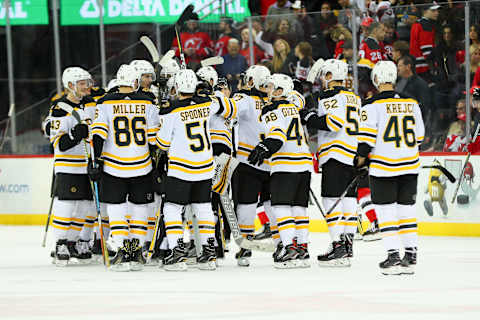
(3) 2010-11 Bruins Versus (6) 2014-15 Rangers
Game 1
Final. 4. 95. 1. 70
The 2014-15 New York Rangers draw first blood in this series, taking Game 1 by a score of 4-1. This New York team was famous for their speed game, as opposed to Boston’s physical one, and this distinction was obvious when the Rangers came out flying to start the first period.
Ryan McDonagh struck first just 1:14 into the game to put New York up 1-0. Marc Staal scored at the 12:25 mark and Chris Kreider joined the fun at 14:32, allowing the Rangers to take a 3-0 lead into the intermission.
The Bruins then came out and flat-out dominated the second period. Their persistence was rewarded at the 11:09 mark when Mark Recchi got them on the board.
Just when it looked as though Boston would have all of the momentum going into the final frame, Derick Brassard struck with just 14 seconds left in the second period to restore New York’s three goal lead.
Game 2
95. 3. 70. Final. 2
There was no fast start for either team in this one, as the first period went by scoreless. The only power-play was for the Rangers, who failed to convert. Shots were 10-7 New York after one.
The second period was much the same, with very little action, even in the way of shots, which were 8-6 in favor of Boston. It was the Bruins who would finally break the deadlock, as Blake Wheeler scored at 15:29 of the period to put Boston up 1-0 heading into the third period.
In the final frame, however, the game began to boil over. The fun started at 8:43, when Kevin Hayes got the Rangers on the board. Less than a minute later, Mats Zuccarello put the Rangers on top at 9:37.
The lead was short-lived, however, as barely a minute after that, Milan Lucic struck at 10:49 to tie the game up at 2. There was no scoring the rest of the way, but plenty of chances for both teams, with shots in this period finishing up at 14-12 for the Bruins.
At 5:44 in overtime, it was Nathan Horton with his second point of the game to get Boston the win and tie the series before heading over to Madison Square Garden.
Game 3
1. 95. Final. 3. 70
The Bruins take back home ice with a 3-1 win to earn a 2-1 series lead. Rangers forward Chris Kreider continued his hot start to the series, opening the scoring at 4:10 of the first period to put the Rangers on top 1-0 early.
Less than two minutes later, however, it was Blake Wheeler at 5:59 of the first period tying the game. The game grew more chippy from there, with both teams taking penalties. The more physical Bruins took advantage, with Horton scoring his second goal in as many games at 13:50 to put Boston up 2-1 heading into the second period.
After a scoreless second period, it would be Horton scoring his second goal of the game to put Boston up 3-1 at the 2:52 mark. The Bruins shut the door from there to seize the victory and the series lead.
Game 4
70. 3. 95. Final. 0
The game was very physical, but more penalties were called than earlier in the series, and the speedy Rangers took advantage. Chris Kreider once again opened the scoring, giving the Rangers the 1-0 lead exactly five minutes into the first period.
After the rest of the period went off without a hitch (including Boston killing off a 5 on 3), the Rangers got off to another fast start in the second period, as Ryan McDonagh struck just 1:23 into the second frame to put New York up 2-0.
Things then went from bad to worse for the Bruins, as Dominic Moore scored at 7:05 of the second period to give the Rangers the final, unassailable 3-0 lead. The Bruins had their chances, but hurt themselves by continuously taking penalties.
Game 5
0. 95. 4. 70. Final
There was no scoring in the first period, but the story of the game was evident even then. The Rangers took two penalties and drew none of their own. Although they survived them, the constant penalty kills made it difficult for them to get into a rhythm.
The second period began with New York on the penalty kill, but they ended up having the first chance of the frame when Rick Nash was awarded a penalty shot. Unfortunately, he was stopped by Tim Thomas.
That miss would come back to haunt the Rangers, as Tyler Seguin scored for Boston at the 5:55 mark, followed by a Brad Marchand goal at 9:21 to put the Bruins up 2-0 at home halfway through the second period. Marchand scored his second goal of the game on the man advantage at 16:04 of the frame. 49 seconds later, Zdeno Chara added an insurance marker to put the game out of reach.
Game 6
Final. 0. 70. 1. 95
Thanks to the third shutout in a row in this series, there will be a Game 7! The only scoring came courtesy of Derek Stepan at the 3:14 mark of the first period. After that, both teams went 0/2 on the power play, and that was it for scoring in this game. It was truly a defensive goaltending duel between two great goalies in Henrik Lundqvist and Tim Thomas.
Game 7
95. 2. 70. Final. 1
(3) 2010-11 Boston Bruins over (6) 2014-15 New York Rangers 4-3
The first two periods told two completely different stories. New York, who outshot Boston 11-6, dominated the first 20 minutes but were unable to tickle the twine. The second period saw the Bruins outshoot the Rangers 15-8, but similarly fail to score.
The third period, however, saw Brad Marchand scoring just 50 seconds in, giving Boston the icebreaker more than 40 minutes into the game.
Of course, that would not be enough to put the Rangers away, and halfway through the period, it was Mats Zuccarello scoring an unassisted goal at 10:42 to tie the game. At the 3:41 mark of the first overtime period, Marchand scored his second goal of the game to carry the Bruins into the second round.
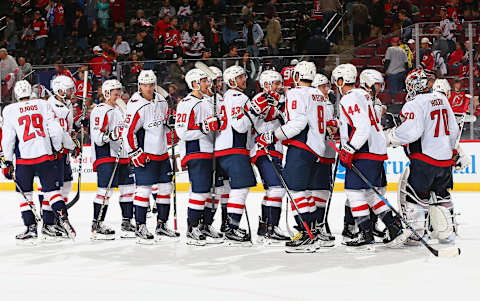
(4) 2013-14 Kings Versus (5) 2009-10 Capitals
Game 1
19. 2. 67. Final. 3
The home-team Kings controlled play for most of the first period, outshooting Washington 15-10 in the frame. Their persistence paid off late in the period, as Justin Williams opened the scoring at the 17:24 mark.
The second period was more even, but the Kings got into some penalty trouble late in the frame, and Washington’s vaunted power play got them on the board, with Mike Green’s strike with exactly four minutes left evening the score at 1.
Must Read. Which Number Should Each Team Retire Next?. light
Meanwhile, the third period saw LA dominate the play, outshooting Washington 12-4. Unfortunately, it would Eric Belanger of Washington breaking the deadlock at the 14:16 mark to put Washington up 2-1.
With just 51 seconds left in regulation, Anze Kopitar scored with the goalie pulled to tie the game. The rest of regulation passed on by, and the two teams went to overtime in Game 1. Both teams played sound defensive hockey during the overtime period. At the 12:48 mark it was Matt Bradley scoring the winner for Washington, as the Capitals took the 1-0 series lead.
Game 2
67. Final. 2. 19. 4
The story of this game was the LA power play. The Capitals went shorthanded just nine seconds into the game, and Jeff Carter struck on the ensuing man advantage to give the Kings the early 1-0 lead.
Barely a minute later, Drew Doughty extended the lead, and at the 11:17 mark Carter scored another power play goal to put LA up 3-0. Tomas Fleischmann scored for Washington before the end of the period to give the Capitals something to work with.
Unfortunately for the Capitals, the Kings dominated the second period, outshooting Washington 15-6 in the frame. The only goal of the period came at the 7:24 mark, courtesy of Mike Richards for LA.
Meanwhile, the third period was mostly uneventful, save for a late goal by Eric Fehr to get one back for Washington. The final score was 4-2 LA, as the Kings tied the series up at a game apiece before Game 3 in DC.
Game 3
0. 67. 3. 19. Final
The main difference in this game was that Washington did not allow LA to get out to their fast start. Instead, it was Alex Semin opening the scoring just 3:08 into the game to put the Capitals on top early. Tomas Fleischmann struck at the 6:25 mark for the only goal of the second period, putting Washington up 2-0 entering the intermission.
If the Kings wanted to come out with urgency in the final frame, they did not do themselves any favors when Jeff Carter was tagged with a double minor penalty just six seconds in. Semin scored his second goal of the game on that power play to put the Capitals up 3-0.
Game 4
67. 4. 19. Final. 3
Things could not have started out better for LA, as Jeff Carter struck just 20 seconds into the first period. Their excitement compounded when Justin Williams scored at the 9:36 mark to put the Kings up 2-0.
Unfortunately for LA, just when it seemed as though they would go into the intermission with the momentum, Tom Poti tickled the twine with just 20 seconds left in the frame, getting the Capitals on the board in Game 4.
In the second period, Eric Belanger scored at the 7:33 mark to tie the game. Fehr then got the Capitals the 3-2 lead with his goal at 10:57 of the second frame. Dan Carcillo tied the game 2:58 into the final frame.
However, against the flow of the game, it would be Semin, Ovechkin and Nicklas Backstrom combining to score the game-winner for Washington with just 1:06 to go in regulation.
Game 5
Final. 2. 19. 5. 67
The Kings dominated every facet of this game, and for once they were rewarded. Jeff Carter opened the scoring with another power play goal at 8:49 of the first period, as the Kings took a 1-0 lead into the intermission.
The second period started out well for Washington, when Brooks Laich tied the game at 8:36. However, the Kings scored two goals in 24 seconds, courtesy of Kyle Clifford and Alex Martinez, as LA took a 3-1 lead into the third period.
Any chance the Capitals had of rallying was put to rest when Mike Richards struck just 1:02 into the final frame. Anze Kopitar added a power play goal at the 3:35 mark, and the Kings had a 5-1 lead in the third period. Semin would score a goal at the 6:00 mark, but that was all she wrote for Washington in this one, as they were completely overmatched by a desperate LA team.
Game 6
Final. 0. 67. 5. 19
(5) 2009-10 Washington Capitals over (4) 2013-14 Los Angeles Kings 4-2
It was an emphatic statement victory for Washington, led by their captain. Ovechkin opened the scoring at 5:55 of the first period, his first goal of the series, then added his second just five minutes later at the 10:44 mark.
Both of those goals were assisted on by Backstrom, who would go on to add a goal of his own late in the period. Thanks to that, the Capitals were up 3-0 and entering the second period on a high note.
Things only got better for Washington, as Tom Poti added to Washington’s lead at the 12:45 mark of the second period. The Capitals continued to dominate, and Tomas Fleischmann would end up chasing Jonathan Quick with Washington’s fifth goal at 4:06 of the third period.
With the first round over, let’s take a look at the second-round matchups.
(2) 2016-17 Penguins vs. (8) 2015-16 Stars
(3) 2010-11 Bruins vs. (5) 2009-10 Capitals
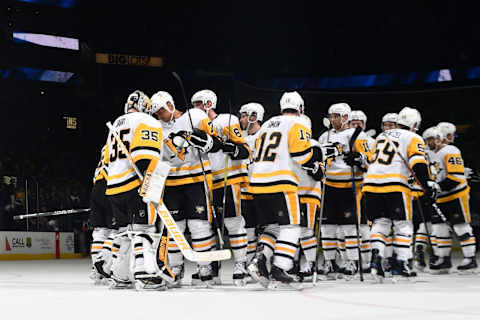
(2) 2016-17 Penguins vs. (8) 2015-16 Stars
Game 1
119. 0. 92. Final. 3
The first period was very even, with both teams controlling play for stretches and getting their scoring chances. However, most of the period went by without any actual goals.
That changed late in the frame, when Tyler Seguin scored the first goal of the series at the 15:40 mark. The Stars added to their lead just moments later, when Cody Eakin struck at 18:33, and Dallas took a 2-0 lead into the intermission.
The second period was also even, much like the first period, but this time it went by without any scoring. The Stars dominated the third period defensively, allowing just five shots on goal. When Jamie Benn scored at 5:10, the Stars had their 3-0 lead.
Game 2
2. 119. 3. 92. Final
Pittsburgh got off to a much better start in this game, as Tom Kuhnhackl struck just 2:32 into the game to get the Penguins the 1-0 lead. Pittsburgh continued to dominate the period, outshooting Dallas 21-11, but it was Vernon Fiddler scoring at 13:31 to tie the game going into the second.
The second period was much more even than the first, with shots at 12-11 for the Stars, but it would be Bryan Rust scoring the only goal of the frame at 14:25 to give Pittsburgh the 2-1 lead heading into the third period.
Related Story. Every Team's Mount Rushmore. light
Any hopes Dallas had of mounting a comeback were dealt a swift blow early in the third, when Patric Hornqvist struck at the 3:15 mark to put Pittsburgh up 3-1. Travis Moen got one back late for the Stars, but it was not enough, and the series is tied heading over to Dallas.
Game 3
3. 92. 5. 119. Final
The outcome of this one was never in doubt, and the writing seemed to be on the wall when John Klingberg opened the scoring just 2:04 into the game. When Janmark struck at 4:39, the Stars were just getting started.
Just over a minute later, Kris Russell continued his strong play in the series by extending the Dallas lead to 3-0. A couple of minutes later, Spezza scored his first goal since the four goal outburst against the Blackhawks in the first round to extend the Dallas lead to 4-0.
In the second, Malkin cut the lead to 4-1 and giving Pittsburgh some hope. Any hopes the Penguins had of mounting a rally were quickly dashed when Seguin scored just 43 seconds into the third period, extending the Dallas lead to 5-1 and chasing Murray from the net.
Game 4
119. Final. 1. 92. 3
This was a very physical game, with both teams taking penalties during the first period. There was no scoring until the 17:38 mark, when Antoine Roussel took the lid off with his first goal of the series. However, Phil Kessel responded at 18:26 to tie the game going into the intermission.
The Stars then got out to a fast start in the second period, as Tyler Seguin scored again just 2:03 into the period to restore the Dallas lead. That was it for the scoring in the frame, although Dallas continued to control the play, outshooting Pittsburgh 13-9. Jason Demers’s late empty-netter sealed the deal as the Stars moved one win away from the finals.
Game 5
119. 3. 92. Final. 1
After being completely shut down for the first four games of this series, Crosby finally got on the scoresheet when he opened the scoring at the 9:10 point of the first period. That was it for scoring in the frame, as Pittsburgh took a 1-0 lead into the intermission.
The Stars came out flying in the second period and Spezza’s goal at 10:21 tied the game. There was no more scoring in the period, meaning Dallas was one goal away from advancing in this NHL History tournament.
However, at the 7:38 mark of the third period, it was Guentzel breaking the deadlock to put Pittsburgh up 2-1. Later in the period, Kessel added an insurance marker, and the Penguins forced a Game 6 in Dallas with a big victory at home.
Game 6
Final. 5. 92. 4. 119
The game could not have started off better for Dallas. Tyler Seguin continued his hot streak, opening the scoring just 1:32 into the game. When Justin Schultz was assessed a ten minute misconduct and Jamie Benn scored on the power play, things looked good for the Stars.
However, the second period quickly turned into the Sidney Crosby show. He got the Penguins on the board just 20 seconds into the frame, followed by a Nick Bonino goal at 3:56 to bring Pittsburgh back even.
Crosby struck again at the 11:15 mark to give the Penguins their first lead of the game, followed quickly by Guentzel, extending the lead to 4-2 at 12:46. Spezza got one back for the Stars at 19:14, and it looked as though Dallas would only be back one entering the third period. However, Chris Kunitz restored the two goal lead just sixteen seconds later.
Game 7
92. Final. 2. 119. 3
(2) 2016-17 Pittsburgh Penguins over (8) 2015-16 Dallas Stars 4-3
This game was totally back-and-forth from the get go. Evgeni Malkin, who had been struggling in this series, opened the scoring just 3:26 into the first period to give the Penguins the 1-0 lead on home ice.
That lead was short-lived, however, as Demers struck exactly ten minutes later to tie the game at 1. Dallas dominated the rest of the period, outshooting Pittsburgh 17-8, but there was no more scoring.
The second period saw both teams get more physical, and penalties were called on both sides. It was Sheary who finally broke the tie at 10:03, as the Penguins took the 2-1 lead.
Once again, though, the Stars came right back, and at 15:47 Mattias Janmark tied the game. It looked as though 2-2 would be the score after two periods, but with just 28 seconds left in the frame Nick Bonino scored the go-ahead goal and Pittsburgh took a 3-2 lead into the intermission.
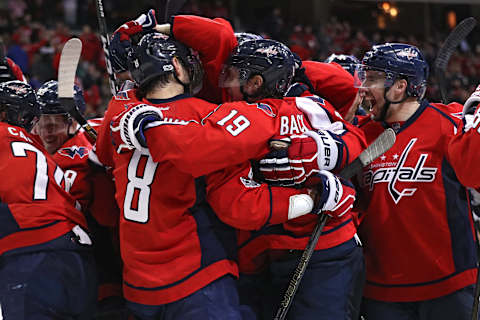
(3) 2010-11 Bruins Versus (5) 2009-10 Capitals
Game 1
19. 4. 70. Final. 3
Most of the first period passed by without anything of note. However, with just over five minutes left in the session, Gregory Campbell scored the first goal of the series to put the Bruins up 1-0. That score held into the intermission.
The second period started out much the same way, and when the Bruins got a power play, things looked bleak for the Capitals. However, it was Brendan Morrison getting Washington on the board with a shorthanded tally at 8:50 to tie the game at 1.
After a few more minutes of Bruins domination, Campbell struck again at 15:05 to restore Boston’s lead. Just seconds later, however, Joe Corvo brought Washington back even, and the score was 2-2 entering the intermission.
Brad Marchand scored at the 6:05 mark to restore Boston’s lead. It looked as though that would be it for the scoring, but Green levelled the score at 18:11 to tie it up and send Game 1 into overtime. The Bruins controlled the overtime session, outshooting Washington 6-2, and with 7:13 elapsed in the period, Daniel Paille scored the game-winner to win Game 1 for Boston.
Game 2
70. Final. 0. 19. 3
The game was all Bruins from the start. Michael Ryder opened the scoring just 1:20 into the game, and after some scoreless play, Zdeno Chara struck at 15:27, giving the Bruins a 2-0 lead entering the first intermission.
The Bruins continued to control play in the second period, and Milan Lucic’s goal at 10:49 had Boston up 3-0 entering the third and final period. A scoreless 20 minutes later, the Bruins had the win and a 2-0 series lead.
Game 3
70. 4. 19. Final. 2
For the first time this round, Washington opened the scoring, courtesy of a Semin goal at 9:42 of the first period. The goal was assisted by Backstrom, so the Capitals were getting contributions from their stars.
At 14:02, Marchand brought the Bruins back even, but the momentum was squandered just seconds later, when Ovechkin scored his first goal of the series at 14:38 to restore the 2-1 Capitals lead.
It looked as though that would be a score entering the intermission, but Bergeron scored a potentially backbreaking goal with just three seconds left in the first period, so the score was instead tied 2-2 at the break.
The second period was a defensive slog, with only 12 shots combined between the two teams. The only goal was for the Capitals, with Mike Knuble scoring at the 8:22 mark to put Washington back on top entering the third period.
Any chance the Bruins had of rallying was squashed at 8:55 of the third period, when Belanger scored the Capitals’ fourth goal and put the game out of reach.
Game 4
Final. 2. 70. 3. 19
For the second time in the series, these two evenly matched teams went to overtime. This time, however, it was Washington coming out on top and tying the series up at two games apiece.
After a scoreless first period, the goals started coming quickly in the second period. Ovechkin opened the scoring at the 5:55 mark, putting Washington up 1-0. Chris Kelly evened things up just a minute and a half later. The score was tied at 1 after two periods of play.
Also. Bruins All-Time Dream Team. light
Tomas Kaberle gave Boston their first lead of the game at 5:24 of the session, but Backstrom responded just 46 seconds later to tie the game at two goals each. After a few moments of scoreless play, the two teams went to overtime.
It was touch and go for Washington, especially when Ovechkin was sent to the penalty box just 28 seconds into the extra session. The Capitals killed it, however, and immediately afterwards, Belanger scored the winner to tie the series up for Washington.
Game 5
Final. 4. 19. 2. 70
For fans of offense, the first period was a beautiful dream. Knuble opened the scoring just 43 seconds in, then added a second goal at the 3:10 mark, putting Washington up 2-0 very early on.
Just moments later, however, Kelly answered back for the Bruins. A few minutes after that, Horton brought Boston back even. That was it for the goals in the period, as the two teams headed into the intermission tied a two.
The Capitals controlled much of the play in the second period, outshooting Boston 14-9, but there was no scoring until Ovechkin broke the deadlock at the 18:32 mark. The only goal in the third period came for Semin at the 8:29 mark, giving Washington the unsurmountable 4-2 lead, and eventually the 3-2 series advantage.
Game 6
Final. 6. 70. 7. 19
(5) 2009-10 Washington Capitals over (3) 2010-11 Boston Bruins 4-2
Wow. That is really the only way to describe this game, which was the third in the series to require overtime. Both teams went all out to take Game 6, but at the end of the day, it will be the 2009-10 Capitals advancing to the finals of this NHL History tournament.
The two teams traded goals for the first two periods until Tom Poti’s goal towards the end of the second gave the Capitals a 5-4 lead. In the third period, Marchand tied the game right back up at 5-5 at 1:11. Just minutes later, though, Fleischmann put the Capitals back on top.
With time winding down, it seemed as if the Capitals had the game in the bag. However, with the goalie pulled, and only 37 seconds left in regulation, Wheeler beat the goaltender to tie the game at 6-6 and send the two teams into overtime again. After a wide-open overtime featuring 17 shots combined, Backstrom scored at the 11:37 mark.
The final has been set. Of course, it will be the 2008-09 Capitals taking on the 2016-17 Penguins.
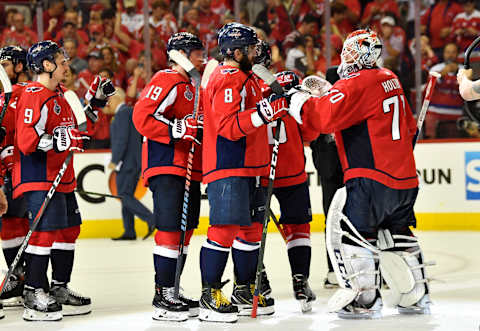
(2) 2016-17 Penguins Versus (5) 2009-10 Capitals
Game 1
92. Final. 5. 19. 4
To the surprise of absolutely no one, the finals of this NHL History tournament begin with an absolute banger of a match. The Capitals emerge victorious, taking Game 1 5-4 and a 1-0 series lead.
After trading goals for most of the game, the Caps took the 5-4 lead they would not relinquish thanks to a timely goal from Belanger at the 16:06 mark. Crosby scored two goals for the Penguins. For the Capitals, Chimera, Bradley, Fehr, and Backstrom also scored.
Game 2
Final. 2. 19. 4. 92
The first period saw much less action in this game, but again it was Bonino opening the scoring at 15:15 of the session to put Pittsburgh up 1-0. This time, they held that lead entering the intermission.
Early in the second period, Schultz struck to extend the Pittsburgh lead to 2-0. Hardly a minute later, however, Ovechkin scored his first of the series to cut the deficit in half, and less than a minute after that, Laich struck to tie the game at two goals each entering the third period.
Crosby had two assists, on goals by Sheary and Kessel, and the Penguins took Game 2 to even the series.
Game 3
92. 3. 19. Final. 2
Even though Carl Hagelin drew first blood, the Capitals were able to fight back and take a 2-1 series lead. Morrison responded to Hagelin’s goal with one of his own at the 18:50 mark in the first period.
Related Story. Greatest Player To Wear Each Jersey Number. light
After a scoreless second period, Green put the Capitals on top 2-1 in the third period. However, Crosby continued his great series with a tying goal with just over two minutes left in regulation. Fehr continued his postseason magic with an overtime goal to give the Capitals a 2-1 series lead.
Game 4
19. Final. 1. 92. 4
For the first time in the series, the Capitals scored first, courtesy of Fehr. The Capitals extended their lead in the second, courtesy of a goal from Bradley at 9:34, but Pittsburgh came right back and Kessel cut the deficit in half with a goal at the 11:40 mark of the period. Washington led 2-1 entering the final frame.
In the third period, Backstrom and Knuble put the game away, each scoring a goal.
Game 5
19. 4. 92. Final. 5
(5) 2009-10 Washington Capitals over (2) 2016-17 Pittsburgh Penguins 4-1
In an epic Game 5, the Capitals have emerged as the champions of this NHL history tournament. Laich and Ovechkin each scored in the first period, though the Penguins struck back in the second period, via goals from Sheary and Crosby. Laich and Sheary then traded goals to make it tied at three after the second period.
As time was winding down, it seemed as though these two teams were headed back to overtime, but with just 1:28 remaining in the stanza, Backstrom beat the goalie to give the Capitals the lead they would not relinquish.
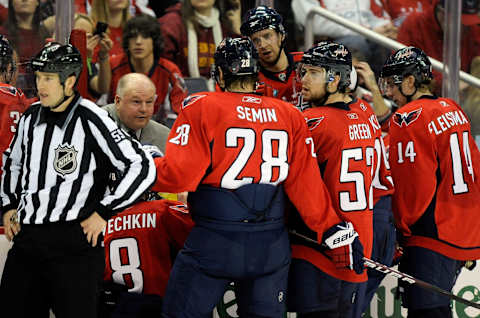
Wrap Up
This was a very interesting tournament to write about. The 2009-10 Washington Capitals has been determined to be the most dominant team in the last decade of NHL history.
Now, it is obviously important to keep in mind that these results have simply been based on a computer simulation. Those would tend to favor teams that were strong on paper, and this Capitals team had two 100-point scorers, a 50-goal scorer and a 40-goal scorer.
Everybody knows that this Capitals team was knocked out of the playoffs in the first round by Montreal, a result that still ranks as one of the greatest upsets in NHL history. This simulation would not have been able to use whatever intangibles worked against Washington in that series.
Because of that, it is impossible to say for certain that the 2009-10 Capitals were the most dominant team of the last decade. My personal pick for that would still be the 2012-13 Chicago Blackhawks, who won the Presidents’ Trophy and Stanley Cup that year.
What this exercise has shown, though, is that the 2009-10 Washington Capitals were perhaps the best built team of the last ten years in the NHL. The collection of individual talent and chemistry on that squad meant that they probably should have defeated any team they came across.
What do you think? What takeaways are there from this tournament using the What If simulator? Who, in your opinion, is the most dominant team of the last decade?
Next. One Reason Each Team Should Be Excited For Next Season. dark
Thank you so much for following along in this series! Be sure to stay tuned to Puck Prose as the hockey season starts up soon!